| dc.description.abstract | The concept of offshoring of professional services first gained attention slightly over 25 years ago. At that time, US companies began to realize the cost-advantage of getting their computer software developed in India and other countries. The concept gained momentum with the advent of Internet and the availability of inexpensive communication technologies. Unrelated events, such as the need to address the Y2K problem, in a timebound manner, further increased the use of computer personnel based in faraway places. Studies conducted by professional organizations, such as ACM, IEEE, and NSPE, focus on the cost and labor aspects of offshoring and its direct impact on employment opportunities in the countries involved. This paper broadens this perspective by emphasizing that the key drivers for offshoring will be strategic, not economic, over time. A formal mathematical model is presented to highlight the new trend. Further, instead of a binary model in which the work is performed in the country of the sponsoring organization or a different country, we will gradually see a new work paradigm in which the work is performed in a sequence in factories located in multiple continents of the world. Such 24-Hour Knowledge Factories can leverage factors beyond cost savings. One can employ professionals in multiple parts of the world, perform tasks at all times of the day, and bring new products and services quicker to the market. Just as the advent of multiple shifts allowed machines to be utilized round the clock leading to the benefits of the Industrial Revolution, the creation of new globally distributed workforces and global partnerships can lead to major strategic advantages for companies and countries alike. | en_US |
